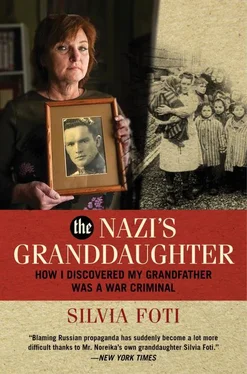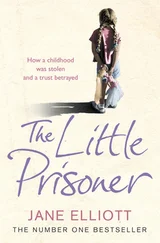“How’s Dalytė?” she asked.
“Badly.” I couldn’t bring myself to describe the condition of her sixty-year-old daughter.
My grandmother dropped her fork onto her plate. It clattered loudly. She gazed out the window, her dulled blue eyes blinking at the relentlessly falling snow.
“Did she wake up yet?”
“No.” That one word was all I could manage. I burst into tears.
She pushed away her food.
We gripped each other’s hands, and in our unified sobs felt almost bonded into a single being. Eventually, not noticing that the nurse had taken away my grandmother’s tray, or that the pink sun had set, we tried to compose ourselves. The room had gotten dark. I turned on the light.
“She asked me to write the book.”
“What will you do?”
“I promised.”
My grandmother covered her face and shook her head. She clearly did not approve of my mother’s request. I took that to mean that Močiutė—unlike my mother—believed that I was inadequate to the task, that I couldn’t possibly do the story justice.
Of course, she was right.
But I had no choice.
Vilnius
October 1, 2018
The Genocide Centre would like to call the court’s attention to the fact that S. Foti, living in the United States, was not a participant in the historical events in question (she was not yet born), nor is she a professional historian. Her opinion about her grandfather is directly opposed to her mother’s, J. Noreika’s daughter. One can conclude from the published research of S. Foti that she is not familiar with the accepted methodology of historical research, such as that conducted by academic historians—which requires deep, critical analysis within a proper historical framework.
Vilnius Regional Administrative Court File No. el-4215-281/2018 Response from the Genocide Resistance and Research [Centre] to the prosecution’s claim against the Genocide Centre’s refusal to change its historical conclusion on Jonas Noreika
CHAPTER TWO
Confronting the Shrine
Chicago 2000
Still dazed and enraged at her abrupt deterioration, I was ill-equipped to deal with the loss of my mother. I experienced it as desertion.
I was home, battling a headache from a rambling, anxiety-ridden, wine-filled night with my younger brother Ray, when he phoned at 6:00 a.m. to tell me that she had stopped breathing.
Rolling over in bed into my husband’s arms, I wailed, “How could I have missed the moment?” My endless hours at the hospital seemed to have been an exercise in futility. I had planned to be there at the moment of her death, holding her hand and ushering her to the other side, but had failed.
When the phone had rung three hours earlier, it had been my father calling from the hospital to let me know that my mother had little time left. I had thanked him and said I would be right there. Why hadn’t I rushed to the hospital then? I had tried to sit up, but my head felt leaden, as if it bore the weight of the world, and I had crashed back down, promising myself I would get up in five minutes. Instead, I had slept deeply for another three hours—and dreamt of a mudslide the size of a tsunami crashing through my parents’ living room. The vivid dream vexed me not only for the rest of the day, but also for the next two decades as I labored on this book. What could it mean?
Thick brown muck flowed from the Marquette Park lagoon, oozing down Troy Street, gathering momentum, and advancing toward my parents’ Chicago home.
It started as a thin trickle, then became a thick finger, then a rumbling stream, until it had gathered so much force that it rose like an angry tidal wave, submerging all the cars at the curb. Furiously, it mounted our front steps and crashed through the living room windows.
We were sitting around the glass cocktail table, drinking coffee that morning, and admiring a gray ceramic vase whose curled lips resembled rose petals.
We were startled by a rumbling, deafening sound like the roar of a freight train. As the mud hurtled through the window like a brown fist, we jumped from our seats to escape its punch. Mom and Dad looked shocked—whereas I had been expecting this.
“You see! I told you so!” I said.
Dad dove into his basement office to hide. Mom stood off to the side, trying to balance herself, knee-deep in mud that smelled like putrid fish. Just as the mud was about to reach me, I jumped into the hallway. Somehow, I was holding a mop in my right hand, a bucket in the left.
“What happened?” Mom asked, teetering in the muck.
“I don’t know, but we’ll have to clean it up.”
“How? There’s too much!”
When the sludge touched my ankles, oozing through my toes, it mysteriously came to rest. I felt a measure of relief.
“We can do it,” I declared, having no idea where this false confidence came from.
Mom tried to extract one leg from the mire, then the other, but lurched and fell. Why? Why couldn’t she help me? Did I have to clean everything myself?
Hour after hour, I filled the bucket with mud, which I hurled out the front door. I felt no fatigue, only a bulldozer’s mechanical resolve. The wind blew through the broken windows as I mopped. Slowly, the mud receded, first by an inch, then a foot. The brown goo retreated to the lagoon like a whimpering dog, leaving in its trail a film of dirt and—oddly—soot. A rotten smell, as if the mud from the lagoon had been laden with the stench of corpses, lingered.
By nightfall, the living room glistened.
I showered and downed a cup of coffee in the gloom of my kitchen, still trying to shake off that dream. Then I drove to my parents’ house, about twenty minutes away, to discuss funeral arrangements with my brother and father. The front-door steps seemed to lead to a house of terror; it held a father, but no mother. In my dream, the mud had covered this entire street and these stairs before invading the living room. I didn’t want to go in.
My brother arrived a few minutes later, and together we climbed those stairs. Ray was an engineer who, at our mother’s urging, was pursuing a law degree—as our grandfather had done. Ray had been living in California for the last fifteen years, but had been flying frequently to Chicago on business, especially during this past year. Six inches taller than me, he had blond hair, blue eyes, and a black belt in karate.
“How are you?” he asked.
“Freaked out.”
When Dad opened the door, he looked ashen. He was wearing the same black pants and shirt that he’d been wearing for days.
We stepped into the living room. Mom had decorated it, furnishing it with two chairs upholstered in gold velvet facing two wood-framed and elaborately carved loveseats. Paintings by exiled Lithuanian artists who were close friends of hers adorned the walls. She had particularly loved the Petras Petravičius woodcuts of old pagan rituals and the woodcuts of scenic farms by Magdalena Stankūnas. On the square glass table in the center of the room she had placed a gray petal-lipped vase by Maria Gaižūnas.
I recalled how, in my dream, the mud had swamped every crevice of this room.
As my father and brother sat down, I went to the kitchen to make coffee. Within a few minutes, I overheard arguing.
“She was so beautiful,” Dad said. “I don’t want to hide her beauty from everybody. We have to have an open coffin. She’s too beautiful to cremate.”
“What? Are you nuts?” my brother responded. “We have to follow Mom’s wishes. She wanted to be cremated.”
“I can override that,” Dad retorted.
Читать дальше











